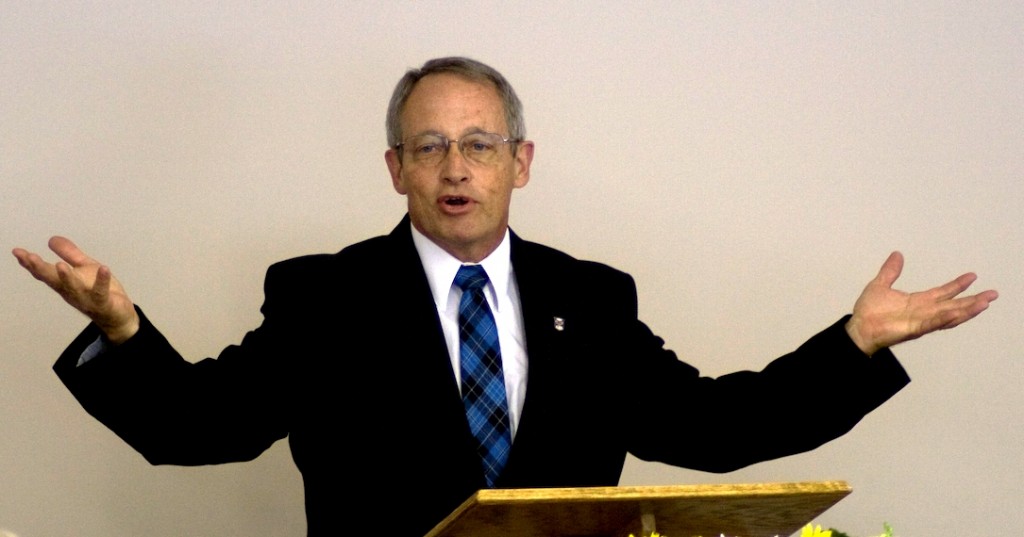The New Covenant In The New Testament (Hebrews 9:1-7, Hebrews 9:11-22, Genesis 17:1-8)
 Rev. William L. Barron, January 29, 2023
Rev. William L. Barron, January 29, 2023Part of the Morning Worship at North Greenville Church series, preached at a Sunday Morning service
The Mosaic Law complements the covenant of Abraham. The threefold purpose of the Law is (1) to reflect to us the perfect righteousness of God and our own sinfulness, (2) for use by the civil authorities to restrain lawlessness and (3) to regenerate into the good works that God has planned for His people. Aspects of the Law testify to God's creative power. He sent the people out of Israel and then brought them back. He called Moses out of Egypt and Midian to save His people. In the covenant of grace, those whom He calls receive the promised eternal inheritance; He puts the Law into His people's hearts; He ordained for Christ's blood to be shed for us on Calvary. In Hebrews, each clarification of the covenant includes the sacrifice of Christ, who upon His ascension sat down at the right hand of God the Father. Each refinement points us to the Lamb of God. All the sacrifices in the Old Testament are fulfilled in Christ. All of this was ordained by the Triune God in eternity past. God is timeless; He created time for our benefit. There is no time in heaven. He communicates His grace as a free gift, bringing forth all accomplishments and blessings. Through Christ's resurrection come salvation blessings and fellowship with God.
| Earlier: | Same day: | Later: |
|---|---|---|
| « The Almighty Deals With The World's Powerful | None | A City Without Walls » |
Hebrews 9:1–7 (Listen)
9:1 Now even the first covenant had regulations for worship and an earthly place of holiness. 2 For a tent was prepared, the first section, in which were the lampstand and the table and the bread of the Presence. It is called the Holy Place. 3 Behind the second curtain was a second section called the Most Holy Place, 4 having the golden altar of incense and the ark of the covenant covered on all sides with gold, in which was a golden urn holding the manna, and Aaron’s staff that budded, and the tablets of the covenant. 5 Above it were the cherubim of glory overshadowing the mercy seat. Of these things we cannot now speak in detail.
6 These preparations having thus been made, the priests go regularly into the first section, performing their ritual duties, 7 but into the second only the high priest goes, and he but once a year, and not without taking blood, which he offers for himself and for the unintentional sins of the people.
(ESV)
Hebrews 9:11–22 (Listen)
11 But when Christ appeared as a high priest of the good things that have come, then through the greater and more perfect tent (not made with hands, that is, not of this creation) 12 he entered once for all into the holy places, not by means of the blood of goats and calves but by means of his own blood, thus securing an eternal redemption. 13 For if the blood of goats and bulls, and the sprinkling of defiled persons with the ashes of a heifer, sanctify for the purification of the flesh, 14 how much more will the blood of Christ, who through the eternal Spirit offered himself without blemish to God, purify our conscience from dead works to serve the living God.
15 Therefore he is the mediator of a new covenant, so that those who are called may receive the promised eternal inheritance, since a death has occurred that redeems them from the transgressions committed under the first covenant. 16 For where a will is involved, the death of the one who made it must be established. 17 For a will takes effect only at death, since it is not in force as long as the one who made it is alive. 18 Therefore not even the first covenant was inaugurated without blood. 19 For when every commandment of the law had been declared by Moses to all the people, he took the blood of calves and goats, with water and scarlet wool and hyssop, and sprinkled both the book itself and all the people, 20 saying, “This is the blood of the covenant that God commanded for you.” 21 And in the same way he sprinkled with the blood both the tent and all the vessels used in worship. 22 Indeed, under the law almost everything is purified with blood, and without the shedding of blood there is no forgiveness of sins.
(ESV)
Genesis 17:1–8 (Listen)
17:1 When Abram was ninety-nine years old the LORD appeared to Abram and said to him, “I am God Almighty; walk before me, and be blameless, 2 that I may make my covenant between me and you, and may multiply you greatly.” 3 Then Abram fell on his face. And God said to him, 4 “Behold, my covenant is with you, and you shall be the father of a multitude of nations. 5 No longer shall your name be called Abram, but your name shall be Abraham, for I have made you the father of a multitude of nations. 6 I will make you exceedingly fruitful, and I will make you into nations, and kings shall come from you. 7 And I will establish my covenant between me and you and your offspring after you throughout their generations for an everlasting covenant, to be God to you and to your offspring after you. 8 And I will give to you and to your offspring after you the land of your sojournings, all the land of Canaan, for an everlasting possession, and I will be their God.”
(ESV)
